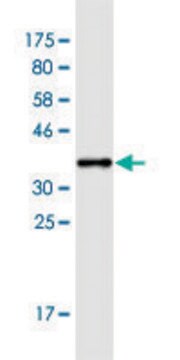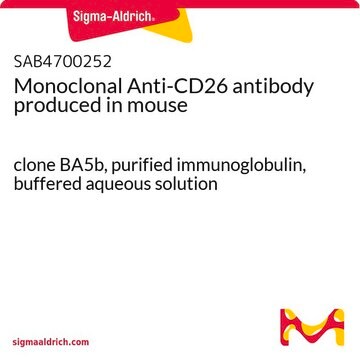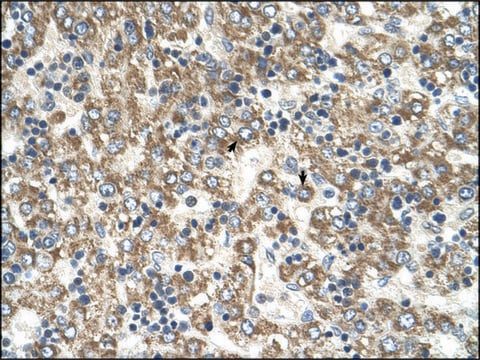Recommended Products
biological source
mouse
Quality Level
conjugate
unconjugated
antibody form
purified antibody
antibody product type
primary antibodies
clone
KU44.13A, monoclonal
mol wt
calculated mol wt 88.28 kDa
purified by
using protein G
species reactivity
human
packaging
antibody small pack of 100 μL
technique(s)
ELISA: suitable
flow cytometry: suitable
immunofluorescence: suitable
immunohistochemistry (formalin-fixed, paraffin-embedded sections): suitable
immunoprecipitation (IP): suitable
isotype
IgG2κ
epitope sequence
Extracellular domain
Protein ID accession no.
UniProt accession no.
shipped in
2-8°C
target post-translational modification
unmodified
General description
Specificity
Immunogen
Application
Evaluated by Flow Cytometry in HPAF-II cells.
Flow Cytometry Analysis: 1 μg of this antibody detected DPP4/CD26 in one million HPAF-II cells.
Tested Applications
Immunofluorescence Analysis: A representative lot detected DPP4/CD26 in Immunofluorescence applications (Arias-Pinilla, G.A., et al. (2020). Sci Rep. 10(1):537).
Immunoprecipitation Analysis: A representative lot immunoprecipitated DPP4/CD26 in Immunoprecipitation applications (Arias-Pinilla, G.A., et al. (2020). Sci Rep.10(1):537).
ELISA Analysis: A representative lot detected DPP4/CD26 in ELISA applications (Arias-Pinilla, G.A., et al. (2020). Sci Rep. 10(1):537).
Flow Cytometry Analysis: A representative lot detected DPP4/CD26 in Flow Cytometry applications (Arias-Pinilla, G.A., et al. (2020). Sci Rep. 10(1):537).
Immunohistochemistry Applications: A representative lot detected DPP4/CD26 in Immunohistochemistry applications (Arias-Pinilla, G.A., et al. (2020). Sci Rep. 10(1):537).
Note: Actual optimal working dilutions must be determined by end user as specimens, and experimental conditions may vary with the end user
Physical form
Storage and Stability
Other Notes
Disclaimer
Not finding the right product?
Try our Product Selector Tool.
Storage Class Code
12 - Non Combustible Liquids
WGK
WGK 1
Flash Point(F)
Not applicable
Flash Point(C)
Not applicable
Certificates of Analysis (COA)
Search for Certificates of Analysis (COA) by entering the products Lot/Batch Number. Lot and Batch Numbers can be found on a product’s label following the words ‘Lot’ or ‘Batch’.
Already Own This Product?
Find documentation for the products that you have recently purchased in the Document Library.
Our team of scientists has experience in all areas of research including Life Science, Material Science, Chemical Synthesis, Chromatography, Analytical and many others.
Contact Technical Service








